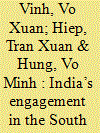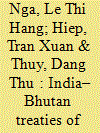|
|
|
Sort Order |
|
|
|
Items / Page
|
|
|
|
|
|
|
| Srl | Item |
| 1 |
ID:
187140


|
|
|
|
|
| Summary/Abstract |
The South China Sea is of immense strategic significance to India from politico-diplomatic, economic and security perspectives. As a rising power, India has expanded its strategic geography and, in this context, it formulated its Look East Policy, which was rechristened as the Act East Policy in 2014. Its current interests go beyond Southeast Asia into the wider Asia-Pacific region, including the South China Sea. From an economic perspective, more than 50% of India’s trade is transported through the sea lanes of the South China Sea. India is also concerned about China’s assertiveness here, in particular its aggressive posturing and militarisation of the disputed Spratly and Paracel Islands and non-adherence to the 1982 United Nations Convention on the Law of the Sea (UNCLOS). India has actively promoted the principles of international law and freedom of navigation and overflight in the South China Sea. Further, the Indian Navy has maintained a regular presence in the South China Sea to protect India’s economic and security interests, which includes the Oil and Natural Gas Corporation’s (ONGC) offshore oil and gas exploration project in partnership with Vietnam.
|
|
|
|
|
|
|
|
|
|
|
|
|
|
|
|
| 2 |
ID:
170630


|
|
|
|
|
| Summary/Abstract |
This article is an attempt to relook at the treaties of 1949 and 2007 between India and Bhutan and argues that the 2007 Treaty is the outcome of the evolution and maturity of Bhutan as an independent and sovereign state, that it is imperative for India to make constant adjustments in its foreign policy towards Bhutan to secure its influence in the tiny but important country and maintain the strength of India–Bhutan bilateral relations. From the side of Bhutan, it is also important to have an ‘alliance shelter’, and India is best suited to meeting Bhutan’s needs for political, economic, societal and strategic shelter.1 By using a historical approach, this article shows why it was necessary for the two countries to renew the 1949 Treaty in the first decade of the twenty-first century. The article uses historical methodology, in combination with interdisciplinary methods such as comparative analysis, generalisation, and expert interviews. Major sources for the paper include the texts of the Treaties, speeches by political leaders and published articles and books by international writers, including writers from India, Bhutan and Vietnam.
|
|
|
|
|
|
|
|
|
|
|
|
|
|
|
|
|
|
|
|
|